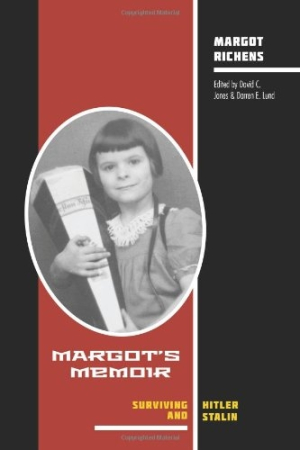
Margot's Memoir
Surviving Hitler and Stalin
Richens blurs the line between guilt and innocence in this eye-opening autobiography of German life during Word War II.
Margot Richens debuts with a revelatory autobiography that brings to light the ups and downs of German civilian life, both during Hitler’s rule and in the chaos that followed. Margot’s Memoir is an introspective, fearless, and illuminating project.
Richens is born in 1930 into a world in which the threat of Hitler already looms. Her family members, German civilians and therefore initially incidental victims of the Nazi regime, at first endure only minor inconveniences during the Nazis’ rise to power. Her parents are continually pressured to join the party, but resist, and suffer economically as the dictator’s aspirations take a national toll. Margot herself is forced into Hitler Youth, the uniform of which she later relishes destroying.
Still, the early childhood Richens relates is a usually happy one, even if it is at times darkened by her temperamental father. Margot’s mother rallies, though, taking her daughter on excursions to enjoy music, see swans, and traipse through Christmas markets. Such scenes, which coincide with the implementation of the Nuremberg Laws and other harbingers of coming terror, are both sweetly melancholy and, devoid as they are of a sense of foreboding, chilling.
Soon, neighbors and friends begin to disappear. Kristallnacht effectively ends any sense of the idyllic. Faced with Hitler’s encroaching war, Margot must leave childhood behind. Her father disappears into forced service abroad, her town falls victim to frequent Allied bombings, and she flees with her mother and sister to the country, where free labor is forced and suspicious listeners are omnipresent.
Richens relates the particulars of these tribulations with visceral detail: the gnawing pain of starvation, the gruesomeness of navigating through rubble and body parts, the cold fear of knowing that you may be reported for your lack of support. By the time the Russian army enters the scene, bringing cruelty, violence, and brutal rape upon conquered German towns, readers have a full and heartbreaking sense of what the war cost its innocent bystanders.
To the field of World War II memoirs, Richens contributes a book rife with piquing philosophical questions. Her sympathies are never aligned with Hitler and his campaigns of death, yet she dabbles in provocative comparisons: How is the segregation of American black troops from their white countrymen different from Hitler’s racism? Were British bombers, who claimed many thousands of lives dropping phosphorus on civilian populations, fundamentally of a different moral caliber than those who administered the gas in the camps? Richens avoids easy answers, welcomes Allied liberation, and still manages to assign culpability fairly.
Rich and wrenchingly detailed, Margot’s Memoir complicates questions of national guilt and innocence during the Second World War, resulting in a challenging, honest, and moving book whose situations and questions will haunt its readership.
Reviewed by
Michelle Anne Schingler
Disclosure: This article is not an endorsement, but a review. The publisher of this book provided free copies of the book and paid a small fee to have their book reviewed by a professional reviewer. Foreword Reviews and Clarion Reviews make no guarantee that the publisher will receive a positive review. Foreword Magazine, Inc. is disclosing this in accordance with the Federal Trade Commission’s 16 CFR, Part 255.
